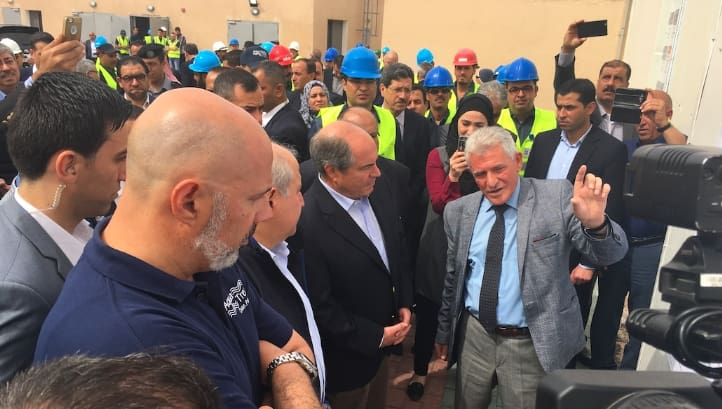The opening of the first seawater reverse osmosis (SWRO) plant in Jordan marks a jumping off point for the country from which it can continue to develop a desalination programme, including the much-anticipated Red Sea-Dead Sea project.
The SWRO plant is purifying high salinity waters
- Gulf of Aqaba is a semi-closed and high salinity body of water
- Plant uses cooling outtake water from KEMAPCO fertiliser business as its intake water
- Jordan’s first RO plant blazes a trail for the technology within the country
The first seawater desalination plant in Jordan, in the Gulf of Aqaba, began production in April 2017. Jordanian water treatment company AquaTreat, which has previously delivered seawater desalination projects for oil companies in the Arabian Gulf, provided all engineering, construction, and technology. The plant uses a conventional system of microfiltration, ultrafiltration, and reverse osmosis (MF-UF-RO), and has capacity of 15,000 m3/d.
Water utility Aqaba Water Company buys 70 per cent of the desalinated water, and Arab Fertilisers & Chemicals Industries (KEMAPCO) takes 30 per cent. The facility uses the cooling water outtake from KEMAPCO’s process as its intake water, and returns the RO brine to the fertiliser company’s drain. “It is seawater, it’s three degrees warmer, plus it’s chlorinated. KEMAPCO does its own screening on its intake, and they chlorinate it,” says Tarek Dehays AquaTreat chief executive.
“The Gulf of Aqaba is a closed gulf in a way. The salinity of the water is higher than normal open water, so we’re reaching 40,000 to 44,000 parts per million (PPM) intake. Our RO output is less than 200 — after lime addition and post treatment we’re reaching 210 to 220 PPM. The plant uses electricity from the grid. (An official report initially said it used methane and solar, but had mixed up the matter with details of a wastewater treatment project in the north of Aqaba.) It’s a seven-year build, operate, transfer contract.
Project paves the way for future developments
- Developers of tourist villages are pushing for permission for desalination plants
- Data from the AquaTreat plant could provide insight to the Red Sea-Dead Sea mega project
- Country’s first RO plant is a “self-affirmation” of capability
Water supplies in Jordan have come under increasing pressure, particularly from large numbers of refugees arriving from Syria over the past six years. Now that the Aqaba project has nudged open the door, developers may find it easier to push ahead with future desalination projects in the country, whether for drinking and sanitation for local populations, or for business and industry. One area of demand is from property developers that want to build tourist complexes, and are seeking permission from the government for desalination facilities.
The other development on the horizon is the Red Sea-Dead Sea mega project, a major infrastructure scheme that will help to protect the Dead Sea environment and to boost water supply for Israel, Jordan, and Palestine. The proposal is for a 220,000 m3/d SWRO desalination plant on the Gulf of Aqaba, whose brine will be piped 180 kilometres across the country to replenish the Dead Sea. Jordan and Israel have raised $400 million towards the conveyance aspect; and the remainder of the estimated $1billion project cost will be met by private finance.
AquaTreat’s project can be seen a positive step towards realising the Red-Dead project, because it puts down a marker for desalination technology in Jordan. “Whatever technical information is coming out is going to be important for the country, because it’s the first trial for desalinated water in the Gulf of Aqaba, which is a very sensitive ecosystem, a very closed gulf. It’s at the end of the Red Sea, so it’s a very, very particular kind of water from a technical point of view, and it will be very interesting for everybody to see the output, and how can this water be dealt with, and what problems might arise over time,” Tarek says. “Jordan now has its own desalination plant, Jordanian built, Jordanian consumed. This is a self-affirmation that we can do it.”
